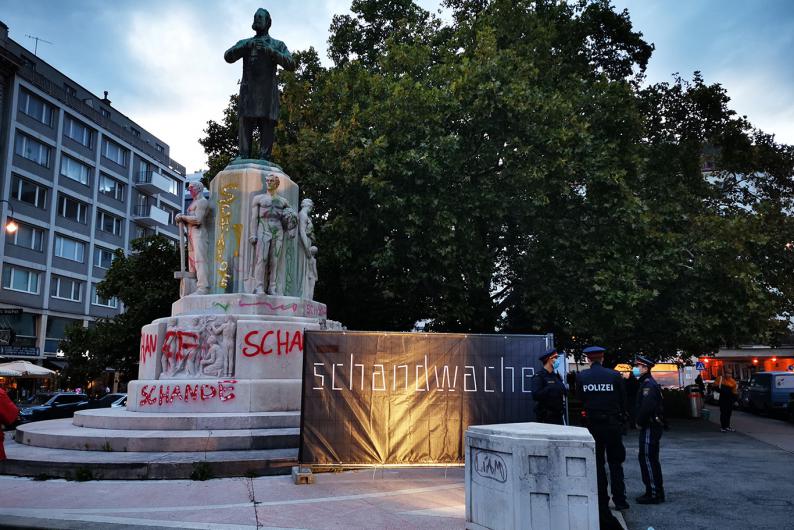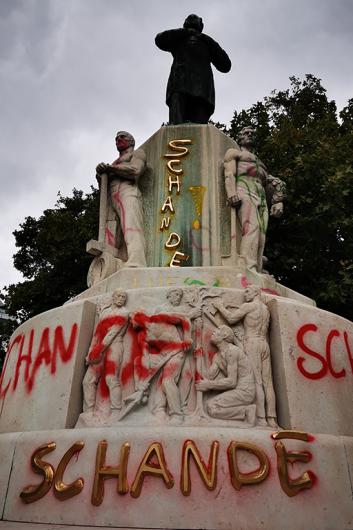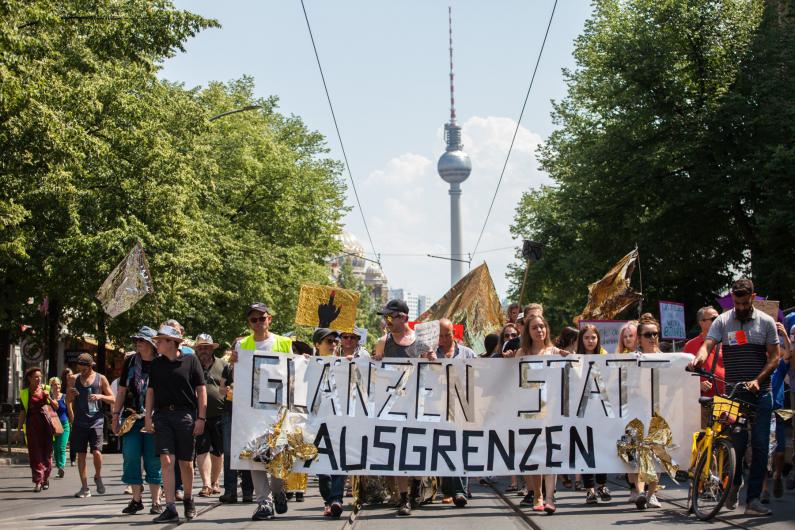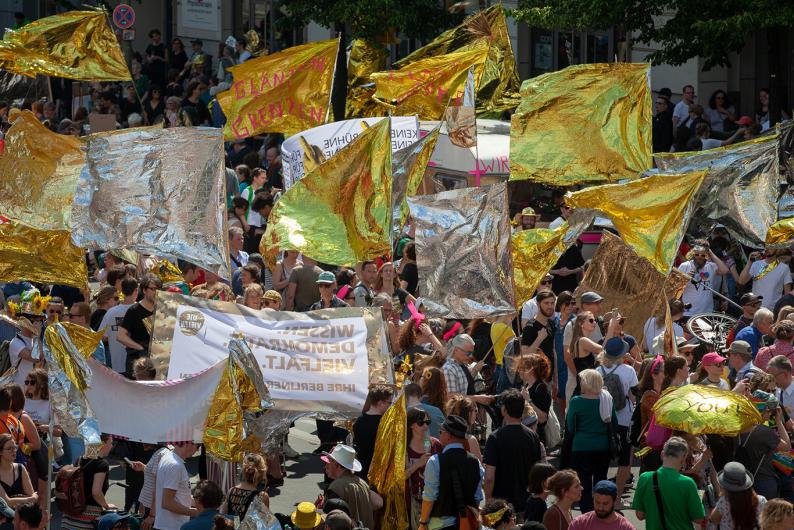Florian Malzacher
Gesellschaftsspiele: The Art of Assembly V – Special edition "Die Vielen"
Assembly of the Many with Eduard Freudmann, Gin Müller, Heidrun Primas, Philine Rinnert. Host: Florian Malzacher
The recording can be watched on demand until June 7th
On the occasion of the action day “Der Vielen” – a solidarity-based association of numerous art and cultural institutions in Austria and Germany – this special edition of The Art of Assembly in cooperation with Kunsthalle Wien takes a look at various artistic-activist actions in Austria’s public space. Heidrun Primas, director of the Graz Forum Stadtpark, is co-initiator of the “Camps für Moria (camps for Moria)”; artists Eduard Freudmann and Gin Müller protest with the “Schandwache (shame guard)” against the monument of the anti-Semitic Viennese mayor Karl Lueger; the stage designer Philine Rinnert is a central protagonist of “DIE VIELEN (THE MANY)” in Germany.
 Visit art-of-assembly.net for videos, podcasts and background info
Visit art-of-assembly.net for videos, podcasts and background info
About The Art of Assembly. Lectures, discussions, online platform
Whether in Tunis, Cairo, Madrid, or Lisbon, in Athens, New York, London, or Istanbul, in post-Fukushima Tokyo, in the midst of Niemeyer’s iconic parliamentary architecture in Brasilia, under the umbrellas of Hong Kong, or on the streets of Minneapolis: social and political movements of recent years have often been characterised by their search for alternative forms of gathering, of arguing and making decisions, of negotiating community and society. The potential of these assemblies lies in more than just the demands they put forward; many of them change reality merely by practicing radical models of democracy.
The arts have also shown a renewed interest in concepts of gathering and creating public spheres in which society is not only mirrored but constantly tried out, performed, tested, reimagined, or even reinvented. There are court hearings on artistic freedom, religion, and censorship; tribunals on exploitation and violence; summits on climate change or cultural policy; parliaments allowing those who are usually silenced to speak... Theatre in particular has become a stage for assemblies on the fine line between art and reality, a democratic arena of radical imagination.
But what is the future this concept of gathering has ahead of it after months in a state of emergency that has thrown pretty much all areas of social life out of step? Gesellschaftsspiele: The Art of Assembly brings together protagonists from various fields of art, politics and theory to speculate on the future of assembly in a time of experiencing that nothing is certain – a time in which every form of physical togetherness has become precarious.
Florian Malzacher is a curator, dramaturg and writer. 2013-2017 he was artistic director of Impulse Theater Festival (Cologne, Dusseldorf and Mulheim/Ruhr), and 2006–2012 co-programmer of the multidisciplinary arts festival steirischer herbst (Graz). He (co-)curated e.g. the 4th and 5th International Summer Academy (Mousonturm Frankfurt, 2002 and 2004), “Dictionary of War” (2006/07), “Truth is concrete” (Graz, 2012), “Artist Organisations International” (HAU Berlin, 2015), “Appropriations” (Ethnological Museum Berlin, 2014), “Sense of Possibility” on the occasion of the 100th anniversary of the revolution (St. Petersburg, 2017), “Training for the Future” (Ruhrtriennale 2018/19 with Jonas Staal), “After Supervising the Machinery” (2020). As a dramaturge he worked with artists like Rimini Protokoll (DE), Lola Arias (ARG), Mariano Pensotti (ARG), and Nature Theater of Oklahoma (USA). Florian Malzacher has edited and written numerous essays and books on theatre and performance and on the relationship between art and politics. His latest publications include Gesellschaftsspiele. Politisches Theater heute im Alexander Verlag Berlin. florianmalzacher.tumblr.com
DIE VIELEN (THE MANY)
With the growing self-confidence of various far-right parties in Europe, the attacks against artistic freedom have also become more massive in recent years. Parties such as the FPÖ or the AfD are increasingly trying to influence art and cultural institutions. DIE VIELEN (THE MANY) is an association of artists and around four thousand different cultural institutions in Germany and Austria who stand as a platform of solidarity against right-wing propaganda and violence and are committed to supporting each other when artists or institutions are threatened or pressured.
DIE VIELEN (THE MANY) organise national actions, demonstrations and various events that oppose hatred and promote coexistence with open borders – both internally and externally. Debates within the theatre and art scene are proving contentious. The association acts as an active network and provides platforms for networking.
The Art of Assembly is based on
Florian Malzacher. Gesellschaftsspiele. Politisches Theater heute. Berlin: Alexander Verlag, 2020.
Pressestimmen
Florian Malzacher interview with Deutschlandfunk Kultur
"It matters that as bodies we arrive together in public, that we are assembling in public; we are coming together as bodies in alliance in the street and in the square. […] So this is a politics of the public body, the requirements of the body, its movement and voice. […] We sit and stand and move and speak, as we can, as the popular will, the one that electoral democracy has forgotten and abandoned. But we are here, and remain here, enacting the phrase, “we the people.”"
Judith Butler, Occupy Wall Street, 2011
Credits
With Oliver Marchart, Chantal Mouffe, Sibylle Peters, Julia Ramírez-Blanco, Milo Rau, Oliver Ressler, Dana Yahalomi / Public Movement and others Guests on May 8th Claudia Bosse (Vienna), Alia Mossallam (Cairo/Berlin) & The Church of Stop Shopping (New York City) Curated by Florian Malzacher
A production by brut – Koproduktionshaus Wien GmbH in cooperation with Kunsthalle Wien
In cooperation with Münchner Kammerspiele and Wiener Festwochen
Dates & Tickets
May 2021
Online livestream at brut-wien.at. Free admission.
Online Livestream via brut-wien.at
Event recommendations
Florian Malzacher
Gesellschaftsspiele: The Art of Assembly VI. ASSEMBLING MORE THAN HUMANS
With Radha D‘Souza & Sibylle Peters. Hosted by Florian Malzacher
Freundliche Mitte
Sportplatz Europa. Order your board game now!
Europe, a Sports Field
brut all over Vienna
brut nordwest
accessible
Nordwestbahnstraße 8-10, 1200 Vienna
Subway: U1, U2 (Praterstern), U4 (Friedensbrücke), U6 (Dresdnerstraße) Tram: 5 (Nordwestbahnstraße) Bus: 5A (Wasnergasse)
accessible
studio brut
not accessible
Zieglergasse 25, 1070 Wien
Subway: U3 (Zieglergasse), Tram: 49 (Westbahnstraße / Zieglergasse)
not accessible
Bears in the Park Art Place
not accessible
Eyzinggasse 12, 1110 Vienna
U-Bahn: U3 (Gasometer) Bus: 72A (Gasometer), 76A, 76B (Simoningplatz)
not accessible
WUK performing arts
barrierefrei
Währinger Straße 59, 1090 Vienna
Subway: U6 (Währinger Straße / Volksoper), Tram: 40, 41, 42 (Währinger Straße / Volksoper), 5, 33 (Spitalgasse), 37, 38, 40, 41, 42 (Spitalgasse / Währinger Straße)
Der Betrieb
accessible
Vogelweidplatz 13, 1150 Wien
Subway: U6 (Burggasse-Stadthalle) / Bus: 48A (Moeringgasse) / Tram: 9 (Camillo Sitte Gasse)











